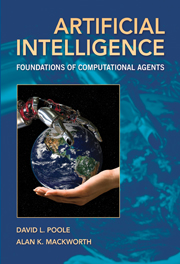Book contents
- Frontmatter
- Contents
- Preface
- I Agents in the World: What Are Agents and How Can They Be Built?
- II Representing and Reasoning
- III Learning and Planning
- 7 Learning: Overview and Supervised Learning
- 8 Planning with Certainty
- 9 Planning Under Uncertainty
- 10 Multiagent Systems
- 11 Beyond Supervised Learning
- IV Reasoning About Individuals and Relations
- V The Big Picture
- A Mathematical Preliminaries and Notation
- Bibliography
- Index
8 - Planning with Certainty
from III - Learning and Planning
- Frontmatter
- Contents
- Preface
- I Agents in the World: What Are Agents and How Can They Be Built?
- II Representing and Reasoning
- III Learning and Planning
- 7 Learning: Overview and Supervised Learning
- 8 Planning with Certainty
- 9 Planning Under Uncertainty
- 10 Multiagent Systems
- 11 Beyond Supervised Learning
- IV Reasoning About Individuals and Relations
- V The Big Picture
- A Mathematical Preliminaries and Notation
- Bibliography
- Index
Summary
He who every morning plans the transaction of the day and follows out that plan, carries a thread that will guide him through the maze of the most busy life. But where no plan is laid, where the disposal of time is surrendered merely to the chance of incidence, chaos will soon reign.
–Victor Hugo (1802–1885)Planning is about how an agent achieves its goals. To achieve anything but the simplest goals, an agent must reason about its future. Because an agent does not usually achieve its goals in one step, what it should do at any time depends on what it will do in the future. What it will do in the future depends on the state it is in, which, in turn, depends on what it has done in the past. This chapter considers how an agent can represent its actions and their effects and use these models to find a plan to achieve its goals.
In particular, this chapter considers the case where
the agent's actions are deterministic; that is, the agent can predict the consequences of its actions.
there are no exogenous events beyond the control of the agent that change the state of the world.
the world is fully observable; thus, the agent can observe the current state of the world.
time progresses discretely from one state to the next.
[…]
- Type
- Chapter
- Information
- Artificial IntelligenceFoundations of Computational Agents, pp. 349 - 370Publisher: Cambridge University PressPrint publication year: 2010



